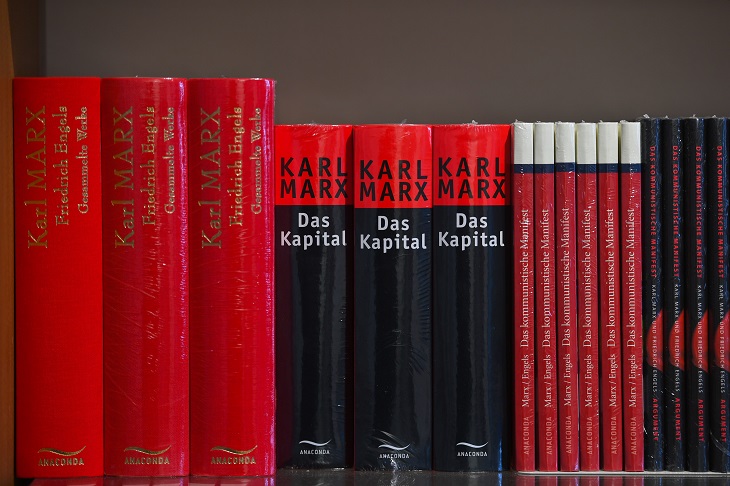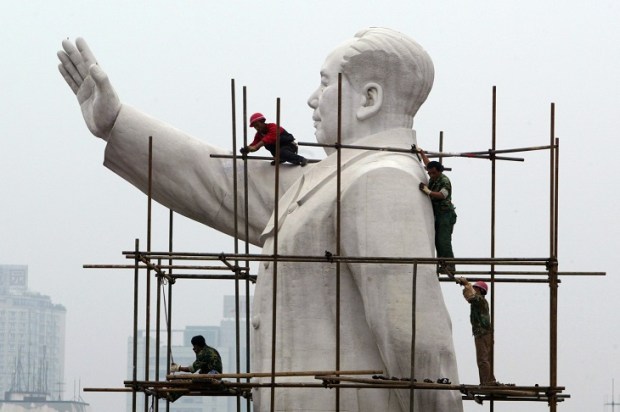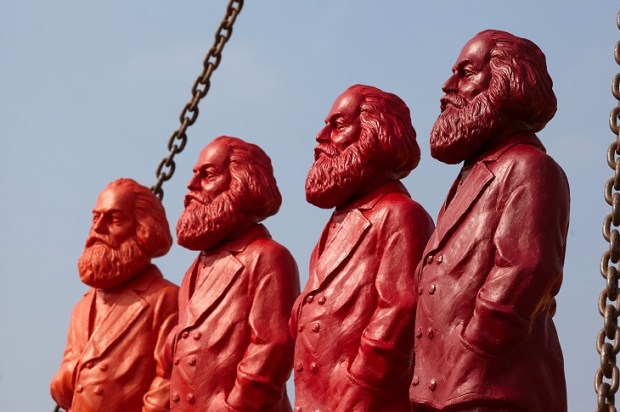This is a follow-up article to my Spectator Australia report last week on Marxism Conference 2023, the Australian Marxists’ three-day Easter shindig at Melbourne University. Mixing with the 1,000 or so comrades and attending presentations gave insight into their view of life.
In Alexandra Marshall’s recent ADH TV live interview with Carl Benjamin, Carl observed that no compromise can be made with the Left. My observation from the Marxism conference is the same. Marxists hold to one central tenet, that capitalism is the cause of all evil in the world. There is no bending of this tenet making compromise from them impossible.
As with my prior conference report, I’m attempting to accurately report Marxist positionings as the Marxists themselves explain them.
I explore two major themes from the conference; war and imperialism, and identity politics. This second theme was particularly challenging to understand.
To keep perspective, I reiterate that Left politics in Australia (and globally) operates on a spectrum. Marxism Conference 2023 arguably presented the purest Marxist positioning.
On war and imperialism
Marxists are vehemently anti-war. But according to the Marxist belief system, war is exclusively a consequence of the capitalist system. Their account of war goes something like this.
Capitalism so is all-pervasive that the nation state is subjugated to it and not above or separated from capitalism. The state is incapable of controlling or limiting capitalism; instead the state does the bidding of capitalism. The outcome is that nation states, as capitalist enclaves, are inevitably drawn to imperialism, the process of extending a nation’s capitalist power and influence through colonisation, and inevitably through war.
The Marxists at this conference draw heavily from Lenin’s description of Imperialism as the highest and most advanced stage of capitalism. They treat this proposition as a biblical-style truth.
Explaining this theme in more detail: capitalism leads to the concentration of capital. Successful firms become large and dominant thereby squeezing out small operators. These capitalist monoliths discipline the state any time they want to by withdrawing capital and crashing the economy. This seems to be a Marxist explanation of economic downturns – namely, capitalists teaching the state who’s the boss. As a current example, much criticism was repeatedly directed at the Albanese government and the Greens for selling out to the capitalists on the recent gas and coal legislation. This, Marxists say, is government doing the bidding off the capitalists to which they are beholden.
Wars occur, Marxists say, because nations manoeuvre to give their capitalists power over the capitalists of other nations. Nations are effectively blocs of capitalists fighting other blocs of capitalists.
Individual capitalists cannot do anything about this. Likewise, individual politicians are captured. All are subject to the dictates of capitalism.
On this view, free markets are a myth and do not in reality exist. In other words, that globalisation, the operations of markets globally, does not stop war. Globalisation’s defenders argue that cross-nation trade and investment remove the ‘capitalist’ trigger for war. A large Silicon Valley tech company, for example, does not want the US to go to war with China because the company has too much invested in China and China is a massive source of profit for the company. This was brushed off by the conference Marxists who instead asserted that capitalists take a long-term view and wear short-term losses for larger market share and profits in other nations. That is, that the tech company example would willingly forgo profits in China if war creates the opportunity to secure larger market share and profits in other nations.
Against the backdrop of current global tensions, these Marxists view China, Russia, and even Iran as imperial, capitalist powers. Each seeks to advance its own imperial ambitions against the imperialist ambitions of the USA and Western powers. This is what causes war: state capitalism versus state capitalism. Again, the Marxist view of war is reduced exclusively to a problem of capitalism.
War, therefore, can only be removed by abolishing capitalism. And to do this what needs to occur is that the people, the workers, revolt and refuse to participate in war. The primary example of this that was cited was the 1917 Russian revolution, where Russian workers refused to continue participation in the first world war and were joined by soldiers who also refused to participate. Speakers also drew on the Vietnam War where the US lost (they argued) because the working class (broadly defined) revolted against the war and US soldiers in Vietnam openly defied orders to participate in fighting (preferring instead drugs, drinking, and loafing). More complex understandings of history are not included in the analysis.
In essence, the belief expressed at the conference is that war can be stopped by ‘the people’ refusing to participate. This leads Australian Marxists, for example, to oppose the AUKUS pact.
On the politics of identity
Perhaps of greatest surprise to this Marxist ‘student’, is the hatred of identity politics, or in more general parlance, Wokeism (a term not used by the Marxists). Essentially the Marxists at this conference conducted a tirade of sarcastic abuse at capitalist, institutional giants for appropriating the cause of the oppressed classes into their marketing and promotion. Think of airlines being LGBTQ+ friendly, police marching in gay pride parades, corporate support for Indigenous causes and so on.
Quite contrary to the probable impression of conservative-minded folk that Wokeism is the inculcation of Left-wing causes into corporate behaviour, that’s not the Marxist view.
What the Marxists rail against is their view that identity politics perpetuates a neo-liberal myth – namely, that oppression is an act of individuals against other individuals. Instead, the Marxist view is that oppression is a class action. Individuals do not oppress. Rather, the seemingly oppressive action of an individual – say, bashing a person who’s a member of a minority group – is an act of the ruling class, not of the individual basher. Further, that the person being bashed is only a victim because they are in the class of oppressed persons.
To the Marxists, what they label as identity politics, assaults their ‘truth’ that oppression is a consequence and product of the ‘worker versus bosses’ class warfare inherent in capitalism. For non-Marxists, this is quite a challenging concept to grasp as it removes individual responsibility from the assessment of an individual’s social and economic behaviour and any legal consequence as a result.
Another strand of this argument is the rejection by Marxists of a current woke proposition – that only oppressed individuals from oppressed classes can discuss or be involved in the cause of the oppressed class. (For example, that only black people can talk about black oppression.) The rejection of this proposition would seem to be at one with the view of ‘neo-liberals’. But if there is an appearance of commonality, it’s for totally different reasons.
Marxists say that all oppressed classes are at one together because oppression is exclusively the product of capitalism. In other words, LGBTQ+ people, coloured people, refugees, indigenous and all minorities are subsets of the working class and oppression only occurs because of capitalism. Therefore, any working-class person has common cause and must fight oppression as part of a united class.
On the surface it may appear that neo-liberals seek the outcome of the removal of oppression. But Marxists say ‘no’. They reserve a special venom for such individualism citing, for example, Thatcher’s free-market individualism. Marxists say that markets are just another form of capitalism in which the primacy of the individual is a con, a ruse, a sly neo-liberal trick to cause the fragmentation of social and class unity. Identity politics is a retreat from class consciousness invented by ruling class capitalists to divide and weaken the oppressed working classes.
The example of the oppression of LGBTQ+ people draws warm approval from conference participants. The argument is put that in pre-capitalist societies people engaged in all forms of sexual activity. The oppression of LGBTQ+ has only developed since the rise of capitalism and occurs because of capitalism. Identity politics has enabled capitalism to cleverly absorb LGBTQ+ individuals into the capitalist system without addressing oppression. The approach that capitalist companies adopt – training their employees to be accepting of LGBTQ+ people within their organisations – does nothing to stop oppression. In fact, it perpetuates the capacity of the capitalist ruling class to oppress.
Former US President Barack Obama came in for particular attack as being a (black) class denier. He told black men to accept individual responsibility, to go out and work, to create a family and a better life. In this, he was and is a lackey for the ruling class capitalist elite. A sell-out. This was stated to much applause.
Marxists say that your identity is defined by your class not your individuality. The accusation is levelled at the Federal Labor Party that it has succumbed to liberal identity politics, thereby making conservatives of the Left.
As a criticism of the Labor Party, federal Labor is probably a legitimate target for the Marxists’ charge. But it is not quite as obvious that the same Marxist’s criticism can be directed at the Victorian Labor Party. Marxist’s apparent rejection of identity politics seems to be embraced in the term ‘intersectionality’. This is defined in the Oxford Dictionary as ‘the interconnected nature of social categorisations such as race, class, and gender, regarded as creating overlapping and interdependent systems of discrimination or disadvantage’.
I googled ‘intersectionality’ and found a prominent post on a website of the Victorian government that states their: ‘Understanding (of) Intersectionality’ translated into government policy where … Family Safety Victoria created the Everybody Matters: Inclusion and Equity Statement to build an inclusive, safe, responsive and accountable system for all Victorians.’
In summary, Marxists reject identity politics because individualism discourages solidarity. They require people to think and work as a collective to further revolutionary activity.
Just these two themes alone, amongst many explored at the conference, give substance to Carl Benjamin’s explanation that there’s no compromise from the Left. All and every analysis of any social, economic or other ‘evil’ always rotates back to the core tenet, that capitalism is the cause.
Ken Phillips is Executive Director of Self-Employed Australia. He also publishes on Substack.
Got something to add? Join the discussion and comment below.
Get 10 issues for just $10
Subscribe to The Spectator Australia today for the next 10 magazine issues, plus full online access, for just $10.


























Comments
Don't miss out
Join the conversation with other Spectator Australia readers. Subscribe to leave a comment.
SUBSCRIBEAlready a subscriber? Log in